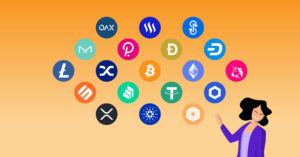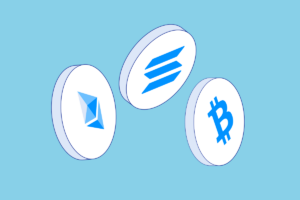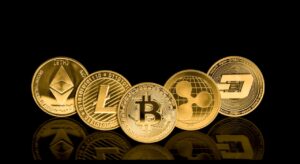Welcome to the world of blockchain tokens!
Blockchain tokens are more than just digital money; they’re revolutionizing how we think about and use value in the digital age.
In this journey, I’ll take you through my exploration of the wide array of tokens that exist on the blockchain.
Think of them as special keys.
But why should you care?
Because understanding these various cryptocurrency tokens is like having a map in an uncharted land.
Knowing the difference between a utility token, a security token, and a governance token is crucial.
So, get ready to dive in!
According to my research, I’ll break down each type of token in a way that’s easy to understand and relate to.
Let’s explore these fascinating digital tokens and see how they change the game in technology, global advertising, and finance.
The Basics and Types of Crypto Tokens
Let’s get down to the basics of blockchain-based crypto tokens.
Imagine blockchain as a digital ledger, and tokens are like the different types of entries in that ledger.
They’re not just digital coins but more like vouchers representing use cases ranging from money to an asset, a stablecoin, rights, and votes.
At their core, blockchain tokens are built on a foundation of technology that makes them secure and hard to fake.
It’s like having a super-secure, high-tech vault that keeps these transactional tokens safe.
These different types of crypto come in different flavors, each with a unique role in a decentralized application.
One category of cryptocurrency includes Bitcoin, Ethereum, or Binance Coin.
These are like the digital version of money used to buy, sell, trade, or as a medium of exchange.
But tokens are more than just spending and trading for DeFi purposes.
Some tokens are created to give you a say in how a project develops, like having a vote in a club or group.
Other tokens often represent a share in a real-world company or even ownership of a digital collectible artwork.
Understanding these basics is key to navigating the exciting world of DApps, blockchain, and crypto.
Each type of token has its own rules and uses, which is why it’s so important to know what you’re dealing with.
Ready to dive deeper into each type?
New to crypto trading? Know How many cryptocurrencies are there?
Utility Tokens: Enhancing User Experience For Cryptocurrency
Now, let’s zoom in on utility tokens.
Think of these as special tickets that let you access certain features or services within a blockchain project.
Utility tokens aren’t about investment or making money directly.
Instead, they’re all about use and experience, and the token represents ownership in the platform.
For example, you might use these crypto coins to play games on a blockchain platform, access a service, or vote on decisions within the community.
It’s like using arcade tokens – they have value in the arcade, letting you play games or get prizes.
One cool thing about utility tokens is how they can create a whole ecosystem for a project to support transactional activity.
These platform tokens benefit users who engage and participate actively to provide additional benefits.
This can include anything from contributing to the project’s development to being part of its governance.
These tokens are the lifeblood of many blockchain applications, making them dynamic and interactive based on usage.
They’re not just sitting in your digital wallet; they are tokens to digital experiences, including gaming and digital collectibles.
Utility tokens show how versatile blockchain technology and the crypto market can be beyond just tokens to purchase.
They’re about being part of something and enjoying the goods and services that come with it.
Ready to see how they compare to other types of tokens?
Let’s keep exploring!
Security Tokens: Digital Representation of Investment in Cryptocurrencies
Security tokens are a whole different ball game in the world of blockchain.
Like stocks or bonds in the digital world, these tokens represent an investment in something real.
This memorializes an ownership interest in a share of stock or the right to a share of profits.
These tokens are digital assets backed by real, tangible assets, similar to what you see in the traditional stock market.
One important thing about security tokens is they come with rules, just like regular securities.
Governments have regulations to ensure everything’s above board with the instrument issued.
This means security token offerings (STOs) must follow these laws, focusing on transparency and investor protection.
Security tokens are exciting because they bring the reliability and legality of traditional currency and finance to the fast-moving, innovative blockchain world without a central authority.
It represents ownership of an off-chain asset, bridging the gap between the old and new ways of investing.
Ready to see how they open up new possibilities in investing?
Let’s move forward and find out.
Recommended Read: Best cryptocurrency derivatives exchanges
Payment Tokens: Facilitating Different Types of Crypto Transactions on the Blockchain
Let’s talk about payment tokens.
These are the stars of the blockchain world when it comes to buying and selling stuff.
Think of payment tokens like digital cash or as a platform token.
They’re specifically designed to be used as a means of payment, making transactions smooth and easy on the blockchain.
Payment tokens, like Bitcoin and Litecoin, are like the familiar coins and bills in your wallet, but in digital form.
You use them to pay for goods or services, just like you’d use cash at a store.
What makes them stand out is their ability to make transactions fast and borderless.
These tokens have gained popularity because they cut out middlemen like banks and are directly tied to the platform’s economy on the blockchain.
This means lower fees and quicker transfers.
Like the US Dollar, their value can go up or down relative to other coins and tokens.
Ready to see how cryptocurrencies are changing the way we handle money?
Let’s keep going!
Governance Tokens: Powering Decentralized Decision-Making Using Different Types of Crypto Tokens
Now, let’s jump into governance tokens.
You are part of a club where voting systems are designed so every member can make important decisions.
That’s what governance tokens are all about.
They allow you to vote on key decisions about a project’s future using blockchain-based voting systems.
Governance tokens are like having a voting card that uses smart contracts in the digital realm.
Holding these tokens means you can vote on changes or updates in a blockchain project.
If you are interested in investing, the more tokens you have, the more your vote counts.
These tokens are a big deal in decentralized projects, where no single boss makes all the decisions.
These tokens are used so everyone who holds them gets their say.
The cool thing about them is that they put the control back in the hands of the governance token holders.
This makes projects more democratic and can lead to better, more community-focused outcomes and similar legal rights.
Are you ready to see how these tokens are changing how decisions are made in the crypto world?
Let’s dive deeper!
Recommended Read: How do crypto exchanges determine their prices?
Non-Fungible Tokens (NFTs): Unique Digital Assets
Let’s talk about Non-Fungible Tokens or NFTs.
These tokens function like none other in the blockchain world.
Imagine NFTs as token types that are one-of-a-kind trading cards with special features you can’t find anywhere else.
That makes them “non-fungible” – they’re unique and can’t be replaced with anything else.
NFTs have taken the digital world and blockchains by storm, especially in the art and entertainment sectors on the Ethereum blockchain.
They represent ownership of unique items, like digital artwork, music, or tweets.
What’s cool about NFTs is how they’ve changed the game for artists and creators.
These tokens support a new way to sell digital art, directly connecting artists with their audience without needing a middleman.
Plus, artists can even get royalties every time their NFT changes hands.
But remember, just like any other asset, the value of NFTs can go through volatility.
It’s important to understand what you’re buying into.
NFTs aren’t just a fad; they’re reshaping how we think about an asset’s ownership and value in the digital space.
Let’s wrap this up with a neat little bow!
Recommended Read: How are crypto exchanges different from traditional stock exchanges?
Conclusion: The Evolving Landscape of Blockchain Tokens
As we wrap up, it’s clear that the world of different types of crypto tokens is ever-changing and super diverse.
From utility tokens that unlock services to governance tokens that allow holders to vote in big decisions, each type has its unique role.
We’ve seen how security tokens are like digital stocks, and NFTs bring a whole new meaning to owning art.
The world of crypto is much more than just digital money – it’s a growing universe of different types of cryptocurrency, each with its own story and purpose.
As technology evolves, who knows what new types of crypto coins and tokens we’ll see next?
The possibilities are endless!





